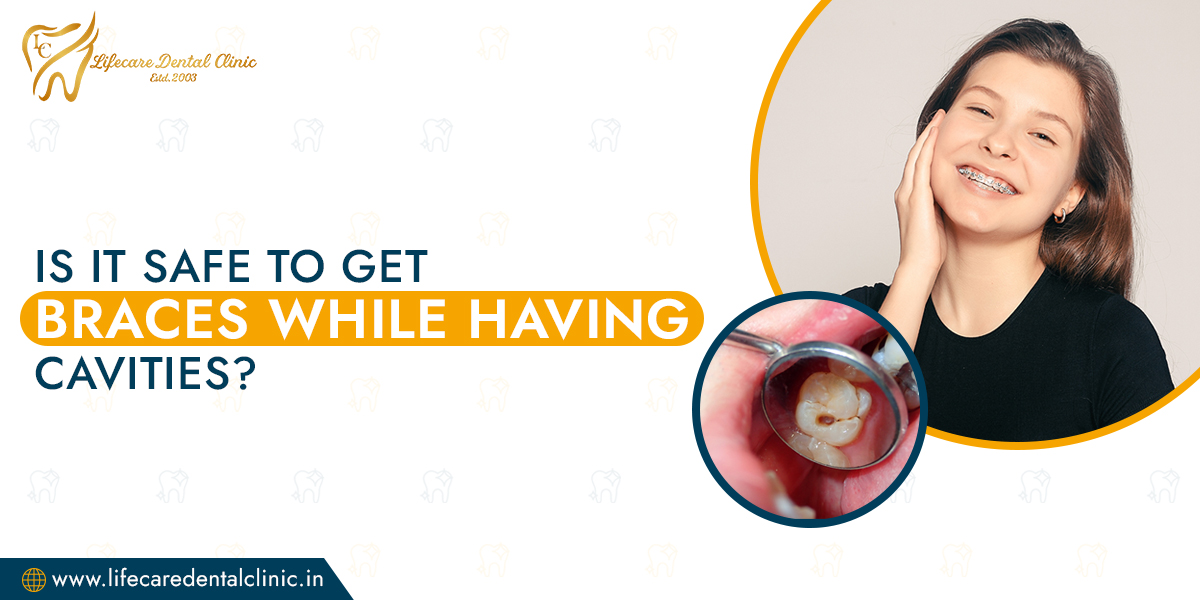Is It Safe To Get Braces While Having Cavities?

Published Date: October 04, 2024 Last Update: October 04, 2024
Author: Dr. Manpreet S. Walia
Tooth cavity is one of the most common dental problems that people of any age can face especially if they have misaligned or crooked teeth. Crooked teeth are more susceptible to tooth decay as they are harder to clean as compared to aligned teeth which later lead to plaque buildup. That’s why it is crucial to get the braces in order to have perfectly aligned teeth but the question arises: Is it safe to get braces while having cavities? Well, the decision of getting braces if you have cavities can be more complicated. But don’t you worry as this blog will help you to get the right information so you can take the right decision. Read on the blog to explore the safety of getting braces while having cavities, the implications of untreated cavities during orthodontic treatment, and how to maintain oral health throughout the process.
Understanding Cavities and Their Impact
Cavities which are also known as dental caries, are areas of decay on the tooth surface caused by bacteria buildup that produce acids from sugars in food. If left untreated, dental caries can lead to severe other dental problems, including pain, infection, or even tooth loss. The presence of cavities can complicate orthodontic treatment due to the increased risk of further decay and complications.
Why Are Cavities a Concern with Braces?
Orthodontic appliance called braces consists of brackets and wires that are attached to the teeth. Because of brackets and wires, there are additional surfaces present which later accumulate plaque and bacteria. This makes it more challenging to maintain proper oral hygiene to prevent dental decay. Ignoring existing cavities while undergoing orthodontic treatment can lead to the following complications:
Increased Pain and Discomfort
Untreated cavities may cause pain that complicates wearing braces comfortably.
Difficulties in Cleaning
Brackets and wires can obstruct effective brushing and flossing which can worsen cavities.
Increased Plaque Accumulation
Food particles can easily get trapped around braces, leading to plaque buildup.
Dietary Restrictions
Certain foods that are sticky or sugary can exacerbate cavity formation.
Higher Risk of Tooth Loss
Severe decay can lead to tooth loss if not addressed promptly.
Extended Treatment Time
If new dental issues arise during treatment, it may extend the duration of wearing braces.
Is It Safe to Get Braces with Dental Cavities?
Before getting braces, it is essential to have a comprehensive dental examination. Most orthodontists will require patients to be cavity-free before starting treatment. If cavities are detected during the initial consultation, they typically need to be treated first. This is crucial because treating dental cavities before getting braces can prevent further decay during treatment. Because untreated cavities can lead to pain or infection, which could delay orthodontic progress.
Treatment Options for Cavities Before Braces
If you have cavities when considering braces, the dentist will likely recommend one of the following cavity protection treatments:
Dental Fillings
For small to moderate cavities, dental fillings can restore the tooth's structure.
Dental Crowns
For more extensive decay, crowns may be necessary to protect the structure of the tooth.
Root Canal Treatment
In severe cases where decay has reached the pulp of the tooth, a root canal treatment may be required before braces can be applied.
How to Manage Oral Health with Orthodontics Braces?
Maintaining oral hygiene becomes even more crucial after getting braces. Here are some strategies to prevent cavities during orthodontic treatment:1. Adopt the Right Oral Hygiene Routine
Brushing
Use a soft-bristled toothbrush to brush at least twice a day. You can use interdental brush to pay special attention to areas around brackets and wires. Interdental brushes can help clean between brackets and wires effectively.
Flossing
Floss daily using orthodontic flossers designed for use with braces. Water flossing using water floss is another great option to dislodge food particles and reduce plaque buildup.
2. Be Mindful of Your Diet
Limit Sugary Foods
Reducing sugar intake by limiting foods like cake, donuts, etc can help minimize cavity risk.
Avoid Sticky Foods
Sticky foods like chewy candies or gummies can cling to braces which can later lead to tooth decay.
3. Regular Dental Check-ups
Regular dental cleanings and check-up visits to the dentist is crucial throughout the orthodontic treatment. This allows for early detection of any new cavities or other dental problems.
Conclusion
For optimal results and a healthier smile post-treatment, individuals should prioritize their oral health by treating any cavities before getting braces. The risks associated with untreated cavities can outweigh the benefits of beginning orthodontic treatment prematurely. A proactive approach involving regular dental check-ups, proper oral hygiene practices, and dietary restrictions will help ensure that both your teeth and your braces remain in good condition throughout your orthodontic journey. By taking these steps seriously, you can enjoy the benefits of a straightened smile without compromising your dental health along the way.

Leave A Reply